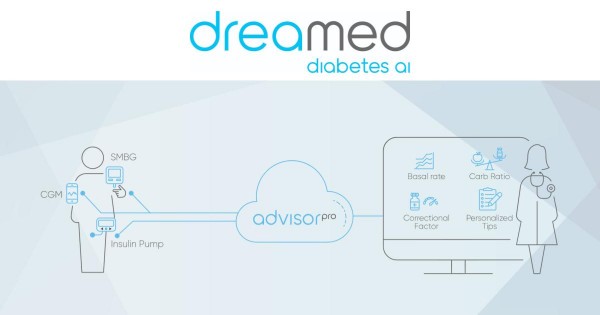DreaMed to Participate in $5Million Study for Virtual Healthcare for Diabetic Patients
Indeed, coronavirus has taken every one and every industry on edge. Now, most people have their food delivered, students take their classes online, and various companies to resort to online platforms. This includes the medical field resorting to telemedicine solutions.
With the heightened risk of leaving one's home, online consultations have proven helpful to patients. However, virtual services may have limitations and might need further research.
Developer of AI-based diabetes healthcare and management solutions, DreaMed Diabetes, has recently announced that they will be participating as a subcontractor in a study conducted by the Jaeb Center for Health Research Foundation. The foundation has received a $5 million funding from The Leona M. and Harry B. Helmsley Charitable Trust.
The Drive of the Study
Even before today's social distancing guidelines, the treatment of diabetes in the United States has already been bound by the lack of medical support. With the limited ratio of endocrinologists to diabetic patients in the country, not all patients receive the guidance and information they need.
This includes overseeing continuous glucose monitoring or CGM, regulating insulin dosing in patients, and monitoring the mental health of patients. Because of these limitations, telemedicine has proven its potential when it comes to serving more patients, so it has now become a necessity.
And while this shift to the online world is exciting, a comparison on the effectiveness of virtual and in-person healthcare could not be avoided. One question that needs to be answered is whether telemedicine provides better outcomes than traditional healthcare methods or not.
The Pilot Study
In January of 2019, the Jaeb Center for Health Research Foundation conducted a pilot study to look at the efficacy of introducing CGM outside the clinic. Over three months, patients received remote personalized support through CGM. The participants were said to improve their glycemic outcomes and quality of life.
The Full-Scale Study
This time, the study will cover a more rigorous model for analyzing virtual diabetes management. This will include the evaluation of CGM use over time, glycemic- and participant-reported outcomes, healthcare utilization and cost, decision support tool effectiveness, and mental health support impact.

The full-scale research will involve 300 participants with type 1 and type 2 diabetes, who are currently not using CGM. It will be conducted over six months and will include virtual management of insulin dosage. This will be done using the DreaMed Advisor Platform, which will allow users to view and manage treatment plans.
In this study, the platform will provide personalized recommendations on insulin dosages for the patients, a first for DreaMed Advisor.
DreaMed's Technology
As its expertise, DreaMed will develop a personalized solution for the remote monitoring and treatment of diabetes. The technology will include a data system that will gather information from CGM, SMBG, insulin pumps, and connected insulin pens. The data will then be translated into visual information on web and mobile applications, available to both the patient and the physician.

In addition to remote monitoring, the solution will also include support algorithms that will help optimize insulin treatment plans by determining whether the patients need insulin pumps or multiple daily injections therapy.
It will also include a virtual clinic team that will coach the patients and help them overcome diabetes-related problems. Other monitoring and treatment plans can also be communicated through the platform.
Chief Product Officer of DreaMed Diabetes Eran Agmon expressed his excitement in the upcoming study. "We are thrilled to be involved in Jaeb's VDiSC study," he said. "Virtual care is the future of medicine, and the technology is ripe for deployment in diabetes. We are confident in the model and proud that our technology is providing the support necessary to enable its implementation."
READ NEXT: Researchers Introduce New Test to Identify Children Who Are Likely to Develop Type 1 Diabetes
Aug 11, 2020 07:58 AM EDT





